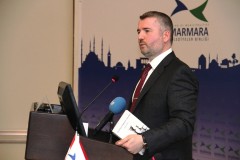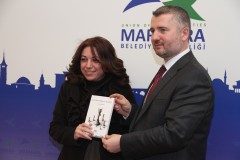17/04/2013
Yerel Yönetimler Uluslararası Alanda Güçlendirilmeli
17 Nisan 2013
“Yerel Yönetimler Uluslararası Alanda Güçlendirilmeli"
“Yerel Dış Politikanın Temelleri” kitabının yazarı ve Amerikan Uluslararası İşbirliği Ajansı USAID’in Ortadoğu Yerel Yönetimler Kıdemli Danışmanı Murat Daoudov, Türkiye’de yerel yönetimlerin giderek uluslararası alanda aktif olduklarını fakat bu alanda yetkin olmadıklarını söyledi.
(Semineri izlemek için: http://www.marmaratube.com/videos/26/yerel-d-politikan-n-... )
İHLAS HABER AJANSI (İHA), HATİCE ÇEKER
Marmara Belediyeler Birliği tarafından düzenlenen “Yerel Dış Politika Kavramı ve Türkiye için bir Model Önerisi” konulu seminerde Amerikan Uluslararası İşbirliği Ajansı USAID’in Ortadoğu Yerel Yönetimler Kıdemli Danışmanı Murat Daoudov, dünyadaki gelişmeler ışığında yerel yönetimlerin yurtdışı çalışmaları temel dinamiklerini anlattı. Küreselleşme ve demokratikleşme gibi iki paralel olgunun müşterek etkisi ile yerel yönetimlerin artık “uluslararasılaştığını” anlatan Daoudov, Türkiye’de içte yerel yönetim anlayışında çok yol kat ettiğini, ancak dış boyuttaki çalışmalar alanında gelişmiş ülkelere nazaran yetkilerinin hayli sınırlı kaldığını belirtti.
“Yerel yönetimler artık bu alanda güçlendirilmeli ve yetkilendirilmeli” diyen Murat Daoudov, “Çünkü ülkenin genel gelişiminin en önemli aktörlerinden biri yerel yönetim. Ülkelerin uluslararası etkinlik alanları bağlamında da bu böyle. Gelişmiş ülkelere baktığımız zaman hakikaten yerel yönetimler uluslararası işbirliğinin giderek aktif olan aktörleridir. Türkiye yerinden yönetim ve demokratikleşme konusunda büyük mesafe kat etti, ancak onun daha gelişmiş olan ülkelerle yarışması gerekli, geldiği noktada durmaması gerekir. Fakat unutmamak gerekir ki, Türkiye’de son 10 yıl içerisinde belediyelerin de örnek göstereceği, dış dünya ile paylaşabileceği olağanüstü faaliyetleri var” diye konuştu.
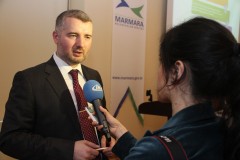
Türkiye’de yerel yönetimlerin uluslararası faaliyetleri konusunda sınırlayıcı rejimin benimsendiğini belirten Daoudov, şunları söyledi; “Gelişen ve değişen, siyasî ve ekonomik olarak güçlenen bir ülkenin yerel yönetimlerin de dünyaya dönük aktif olmaları beklenir. Ancak Türkiye’de belediyeler dış ilişkilerde etkin ama yetkin değil. Yetkiler bağlamında çok sınırlı bir çerçevede faaliyet gösteriyorlar. Daha dün sosyalist rejimlerden çıkmış ve ekonomik olarak zayıf kalan ülkeler bile kendi belediyelerin uluslararası ilişkilerini bu kadar sınırlamadılar. Türkiye’nin misyonu ve tarihî bağları olan bölgelerin beklentileri karşısında gereğini yapabilmek için belediyeler bazen mevzuata çok uymamak durumunda kalıyorlar. Geçmişteki “dört tarafı düşmanla çevrili Türkiye” psikolojisinden miras kalmış mevzuat artık gözden geçirilmelidir. Türkiye’nin bu anlamda gelişmiş ülkelerin modellerini incelemesi ve uygun olanları örnek alması gerekir.”
Daoudov, seminere katılan katılımcılar için “Yerel Dış Politikanın Temelleri” isimli kitabını imzaladı.
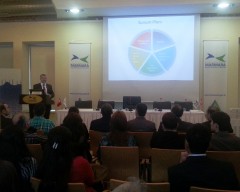
Semineri izlemek için: http://www.marmaratube.com/videos/26/yerel-d-politikan-n-...
http://www.iha.com.tr/yerel-yonetimler-guclendirilmeli-272764-haber
http://www.marmara.gov.tr/newsdetail.aspx?newsId=5848
http://www.2haber.com/yerel-yonetimler-uluslararasi-aland...
http://www.haberler.com/yerel-yonetimler-uluslararasi-ala...
11:42 Posted in Activité | Permalink | Comments (0) | Tags: murat daoudov, yerel dış politika, local foreign policy
06/12/2012
Lisbon Forum discussed the Arab Season
Lisbon Forum 2012: "The Arab Season: from change to challenges"
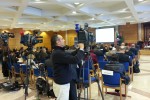
The 2012 Lisbon Forum took place on 3-4 December 2012 in Lisbon/Portugal. The event was organised by the North-South Centre of the Council of Europe in partnership with the UN Alliance of Civilizations. It took place in the framework of the Programme “Strengthening democratic reform in the southern Neighbourhood”, funded by the European Union and implemented by the Council of Europe.
The theme for this year’s Forum was "The Arab Season: from change to challenges". It was a follow-up to the previous year’s edition and focused again on the developments in the Arab countries of Northern Africa and the Middle East in order to take stock of the progress made - and obstacles met - on the path towards democracy. Particular attention was paid to new political élites, youth and women activists and to the process of democratic reforms.
The event report is to be found here while the full programme is available here .
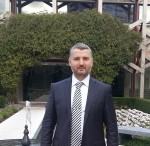
A flashback...
As member of the North-South Centre Think Tank of the Council of Europe, I had the chance to bring my modest contribution to the preparations of the Forum. Namely, I had worked on the initial elaboration of the concept of this year's Forum and actually had proposed its title "from change to challenges" (by the way, a title applauded by many speakers).
Besides, I had proposed to have also discussions on the local governments in the Arab world. This proposal was adopted by the North South Centre which finally entrusted me with moderating the Workshop 3 "Addressing the challenges of democratisation: political reforms, including the reform of local self‐government". This is my third participation in the Lisbon Forum. In 2010 I had moderated the session entitled “The prevention of radicalisation and religious extremism”, while in 2011 I was honoured with moderating the session on Tunisia, the pioneer of the Arab revolutions. This last experience had inspired me to write the article "Can Turkey inspire Tunisia", which was published in several newspapers in the Arab world.
* * *
Here below is the panel setting of this year:
The workshop conclusions have been presented at the closing session of the Forum by Younes Sekkouri:
The session started with a brief introduction of the topic by the moderator stressing the importance of local self-government reforms as a major challenge of democratisation in the Arab world. Then different speakers addressed the issue from various perspectives:
- The Moroccan experience introduced by Mr Sekkouri Younes, Parliamentarian, pointed out the necessity of a complementarity between the central and local governments and the need of identification among the population with the elected bodies. Mechanisms of a better participation are to be found not only in the voting process, but also in involving citizens to follow up the management of their local affairs.
- Mr Tarak Mahdaoui, Member of the Independent High Body for Elections in Tunisia, outlined the situation under the prism of serious regional disparities, which were source of the socio-economic claims in early 2008 and of the source of the Tunisian Revolution in 2011. He pleaded for better regional development policy in the new Tunisia and for political responses to the problem by strengthening the decentralisation and assuring better representativeness of local bodies.
- Mr Christophe Rouillon, Member of the Committee of the Regions witnessed of the French experience in local government and pleaded for more solid European approach in development cooperation. He stressed that in the difficult times of crisis a tendency is to cut from the budgets related to external actions of the Union, which is a historical mistake given the importance of the developments in the neighbourhood to Europe itself.
The workshop panellists and participants formulated following recommendations:
- The institutionalisation of local government in the Arab countries should be properly addressed in the constitutions in order to stress its importance.
- The State's overall architecture should better separate between sovereign/national and local powers to enable complementarity and clarity between different levels.
- The relationship between central and local powers needs to shift from close tutelage to empowerment; the control of opportunity must transform into a control of legality a posteriori.
- Local governments should to be consulted systematically by central powers regarding all national policies that affect local competencies.
- Local governments should be provided sufficient financial autonomy, through increase of local revenues, increase of tax revenue shares and appropriate mechanisms of transfers for a more cohesive development of territories. Thus, regional disparities should be tackled through balanced regional and local economic development policies.
- Local governments should be able to form their associations, for better representation of their interests and better coordination.
- The popular participation in the local life should not be restricted to the election processes; various mechanisms of participatory democracy should be promoted.
- Equality and gender balance should be assured at local level and social groups with specific needs as well as minorities should be taken into consideration.
- The principle of subsidiarity should be promoted and respected; central governments should transfer competencies with sufficient resources to local governments. Thus, countries should seek for an appropriate equilibrium between decentralization and deconcentration.
- The status of a local elected official should be given a clear legal and financial framework in order to allow the good exercise of local responsibilities.
22:48 Posted in Activité | Permalink | Comments (0) | Tags: the lisbon forum, murat daoudov




